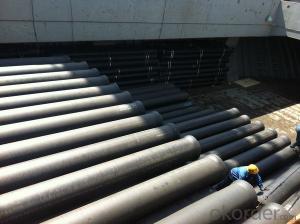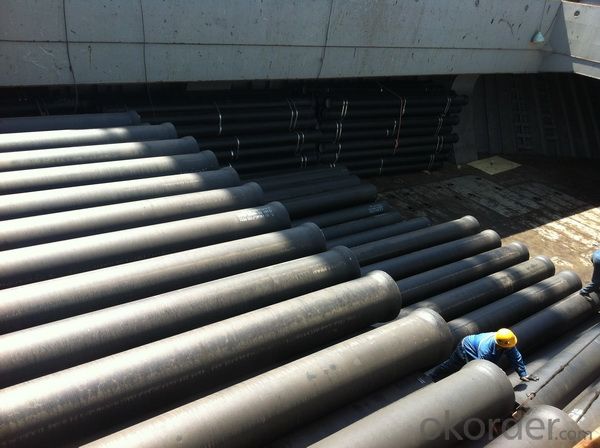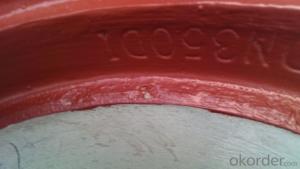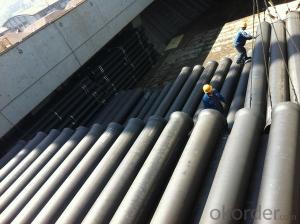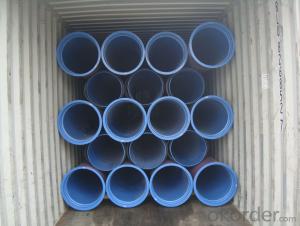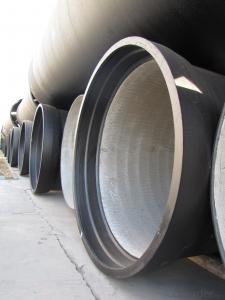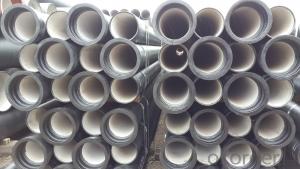T Type Ductile Iron Pipe DN1400 socket spigot pipe
- Loading Port:
- Tianjin
- Payment Terms:
- TT OR LC
- Min Order Qty:
- 200
- Supply Capability:
- 80000 /month
OKorder Service Pledge
OKorder Financial Service
You Might Also Like
1) The standard of pipe: ISO2531:1998, EN545:2006,K9 K8
2) Effective length: 6m/5.7m
3) Inner cement line: Portland cement lineas per ISO4179
4) Zinc coating: at least 130g/m2 as per ISO8179
5) Bitumen painting: at least 70μm as per ISO8179
6)With 102% quantity of NBR, SBR, or EPDM ring asper ISO4633
7) DN80-DN1200
8) Highstrength, lighter than grey iron, good corrosion resistance, no furring, smallflow resistance, easy fixing, long life tome about 100 yeas
9)Checked by automatic inspection equipment
10) Composition:
Chemical composition | |||
Chemical composition | Ductile Cast Iron Pipe (%) | Grey iron pipe (%) | Steel pipe (%) |
C | 3.5-4.0 | 3.2-3.8 | 0.1-0.2 |
Si | 1.9-2.6 | 1.4-2.2 | 0.15-0.4 |
Mn | 0.15-0.45 | 0.4-0.6 | 0.3-0.6 |
P | ≤0.06 | ≤0.3 | 0.02-0.03 |
S | ≤0.02 | ≤0.1 | 0.02-0.03 |
Mg | 0.03-0.06 |
|
|
11) Feature:
Mechanical properties | |||
| Ductile Cast Iron Pipe | Grey Iron Pipe | Steel Pipe |
Tensile Strength(Mpa) | ≥420 | 150-260 | ≥400 |
Yield Strength(Mpa) | ≥300 | No Confirmation | No Confirmation |
Bending Strength(Mpa) | ≥590 | 200-360 | ≥400 |
Elongation (%) | ≥10 | Neglected | ≥18 |
Brinell Hardness(HBS) | ≤230 | ≤230 | About 140 |
12) T type mechanical joint
13) Packing: in bulk or container
PACKING: 1) Pipesare bundled together with the steel belt.
2) Wooden pieces are put between the pipes.
- Q: What is the expected thermal expansion coefficient of ductile iron pipes?
- The expected thermal expansion coefficient of ductile iron pipes typically ranges from 10.8 to 12.2 x 10^-6 per degree Celsius.
- Q: Are ductile iron pipes suitable for mining applications?
- Yes, ductile iron pipes are suitable for mining applications. Ductile iron is a type of cast iron that has been treated to enhance its strength, durability, and ductility. These pipes are known for their high tensile strength and resistance to corrosion, making them ideal for underground mining operations where they may be exposed to harsh conditions. One of the key advantages of ductile iron pipes in mining applications is their ability to withstand high pressure and heavy loads. They have excellent structural integrity and can resist both internal and external forces, ensuring reliable performance in demanding mining environments. Additionally, ductile iron pipes have a long service life and require minimal maintenance. They are highly resistant to abrasion, which is crucial in mining operations where abrasive materials like rocks, minerals, and ores are present. The smooth inner surface of these pipes also minimizes friction, allowing for efficient transportation of mining materials. Moreover, ductile iron pipes are cost-effective compared to alternative materials like steel or concrete. They have a lower upfront cost and require less frequent replacements, resulting in reduced long-term expenses for mining companies. In conclusion, ductile iron pipes are well-suited for mining applications due to their strength, durability, resistance to corrosion and abrasion, long service life, and cost-effectiveness. These pipes provide reliable and efficient transportation of mining materials, contributing to the overall efficiency and productivity of mining operations.
- Q: What are the typical installation methods for ductile iron pipe?
- The typical installation methods for ductile iron pipe involve several steps to ensure proper installation and functionality. Firstly, the trench is excavated to the required depth and width, accounting for the pipe diameter and bedding material. The bottom of the trench is then carefully prepared by removing any sharp objects or debris that could potentially damage the pipe. Next, a layer of suitable bedding material such as sand or fine gravel is placed evenly along the bottom of the trench to provide support and prevent any point loading on the pipe. The bedding material is compacted to ensure stability and eliminate any voids that could cause the pipe to settle or shift over time. After the bedding is in place, the ductile iron pipe is carefully lowered into the trench, taking precautions to prevent any damage to the pipe's protective coating. The pipes are then aligned and supported at regular intervals using appropriate pipe supports or blocks. Once the pipe is properly aligned, the joints are assembled by applying a lubricant and inserting a rubber gasket into the bell end of the pipe. The spigot end of the adjacent pipe is then inserted into the bell end, creating a secure and watertight seal. After the joints are assembled, the backfilling process begins. Backfill material, typically a combination of native soil and select backfill, is carefully placed around the pipe in layers and compacted to provide stability and prevent any voids. The backfilling process is carried out gradually, allowing for proper compaction and avoiding excessive pressure or damage to the pipe. Finally, the trench is fully backfilled and compacted, ensuring that the pipe is adequately supported and protected from external forces. Surface restoration is then performed to restore the area to its original condition, minimizing any disruption caused by the installation process. It is important to note that these installation methods may vary depending on project specifications, local regulations, and engineering recommendations. Therefore, it is essential to consult the manufacturer's guidelines and work closely with qualified professionals to ensure proper installation of ductile iron pipe.
- Q: Can ductile iron pipe be used for directional drilling?
- Yes, ductile iron pipe can be used for directional drilling. It is a strong and durable material that can withstand the stresses and forces encountered during directional drilling operations. Its flexibility and resistance to damage make it a suitable choice for this application.
- Q: Are ductile iron pipes resistant to alkaline attacks?
- Yes, ductile iron pipes are generally resistant to alkaline attacks. Ductile iron is known for its durability and corrosion resistance, making it suitable for various applications including water and wastewater systems. Alkaline substances, such as high pH levels in water or chemicals, can potentially cause corrosion in certain metals, but ductile iron has been specifically designed to withstand these conditions. Its composition, including the addition of alloying elements like nickel and chromium, enhances its resistance to alkaline attacks. Additionally, ductile iron pipes are often lined with protective coatings, such as cement mortar or polyethylene, further enhancing their resistance to alkaline substances. However, it is important to note that the specific resistance of ductile iron pipes to alkaline attacks can depend on factors such as the concentration and duration of exposure to alkaline substances, as well as the presence of other corrosive agents. Therefore, it is always advisable to consult with manufacturers or industry experts to ensure the suitability of ductile iron pipes for specific alkaline environments.
- Q: Can ductile iron pipes be used for drainage systems in airports?
- Yes, ductile iron pipes can be used for drainage systems in airports. Ductile iron pipes are known for their strength, durability, and resistance to corrosion, making them suitable for various applications, including drainage systems. They can effectively handle the high flow rates and heavy loads typically associated with airports, ensuring efficient drainage and preventing water accumulation on runways, taxiways, and other areas.
- Q: Will nodular cast iron pipes rust?
- Ductile iron pipe corrosion process is good, decided whether it will rust. Whether it will rust or not, the key is whether the anti-corrosion process of the nodular cast iron pipe is in place.
- Q: A tube is used only in ductile iron pipes, isn't it?
- Is that the nodular graphite cast iron pipe is called centrifugal ductile iron pipe, it has the properties of nature, iron and steel, excellent corrosion resistance, good ductility, good sealing effect, simple installation, mainly for municipal, industrial and mining enterprises, water supply, gas, oil etc.. Water supply pipe is the first choice, with high cost performance.
- Q: Can ductile iron pipes be used for underground chemical processing systems?
- Due to their limited resistance to corrosion from various chemicals, ductile iron pipes are generally not recommended for use in underground chemical processing systems. Despite being known for their strength, durability, and flexibility, ductile iron pipes can still corrode when exposed to certain chemicals, especially those with high acidity or alkalinity. The use of ductile iron pipes in underground chemical processing systems poses a higher risk of exposure to corrosive substances that can gradually deteriorate the pipes. This deterioration can result in leaks, cracks, and failures in the piping system, compromising its integrity and potentially creating hazardous conditions. To mitigate this risk, it is advisable to consider alternative materials that offer greater resistance to corrosion in underground chemical processing systems. Stainless steel, PVC, and high-density polyethylene (HDPE) pipes are examples of materials that provide superior chemical resistance and can withstand the harsh conditions typically found in chemical processing environments. To determine the most suitable materials for underground chemical processing systems, it is essential to consult experts in chemical engineering, piping design, and corrosion resistance. The proper selection of materials is crucial for ensuring the longevity and safety of the piping infrastructure in such environments.
- Q: Can ductile iron pipes be used for underground chemical transport systems?
- Due to their strength, durability, and resistance to corrosion, ductile iron pipes are commonly utilized in a variety of applications. However, when considering their use in underground chemical transport systems, it is crucial to take certain factors into account. Firstly, it is necessary to evaluate the type of chemicals being transported. Although ductile iron pipes are generally resistant to a wide range of chemicals, including acids, alkalis, and organic solvents, there are some chemicals that can cause corrosion or react with the iron content of the pipes, leading to degradation and potential leakage. Therefore, it is essential to assess chemical compatibility and seek advice from chemical engineers or experts to determine if ductile iron pipes are suitable for specific chemical transport applications. Secondly, the concentration and temperature of the chemicals must be considered. Elevated temperatures and high concentrations of certain chemicals can accelerate the corrosion process, potentially compromising the integrity of the pipes. Therefore, it is crucial to evaluate the operating conditions and ensure that the ductile iron pipes can withstand the chemical concentration and temperature levels. Furthermore, the potential presence of abrasive or erosive chemicals needs to be taken into consideration. If the transported chemicals contain abrasive particles or possess erosive properties, it may cause increased wear and tear on the inner surface of the pipes, reducing their lifespan and potentially leading to leaks. In such cases, it may be more appropriate to use alternative materials with higher resistance to abrasion or erosion. Lastly, it is important to adhere to relevant regulations and standards. Different countries or regions may have specific requirements for underground chemical transport systems, including the selection of materials. Therefore, it is crucial to ensure that ductile iron pipes meet the necessary standards and are approved for use in such applications. In conclusion, while ductile iron pipes have many desirable properties for various applications, including underground use, their suitability for chemical transport systems is dependent on several factors. Before deciding to use ductile iron pipes for underground chemical transport systems, it is essential to carefully evaluate chemical compatibility, concentration and temperature levels, the presence of abrasive or erosive chemicals, and compliance with regulations. Seeking guidance from experts in the field is highly recommended to ensure the safety and effectiveness of the chosen piping material.
Send your message to us
T Type Ductile Iron Pipe DN1400 socket spigot pipe
- Loading Port:
- Tianjin
- Payment Terms:
- TT OR LC
- Min Order Qty:
- 200
- Supply Capability:
- 80000 /month
OKorder Service Pledge
OKorder Financial Service
Similar products
Hot products
Hot Searches
Related keywords
